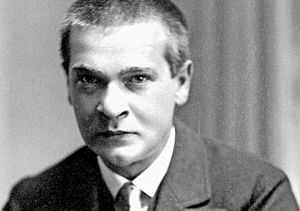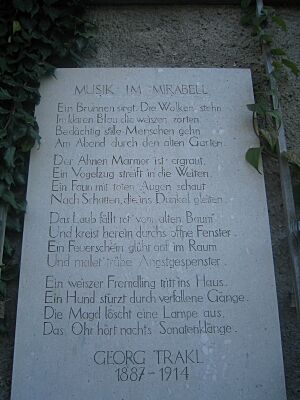Georg Trakl facts for kids
Quick facts for kids
Georg Trakl
|
|
|---|---|
 |
|
| Born | 3 February 1887 Salzburg, Duchy of Salzburg, Austria-Hungary |
| Died | 3 November 1914 (aged 27) Kraków, Austria-Hungary (now Poland) |
| Occupation | Poet, pharmacist, writer |
| Citizenship | Austro-Hungarian |
| Alma mater | University of Vienna (pharmacy) |
| Literary movement | Expressionism |
Georg Trakl was an Austrian poet who lived from 1887 to 1914. He was the brother of a famous pianist, Grete Trakl. Many people consider him one of the most important poets of a style called Expressionism. He is well-known for his poem "Grodek," which he wrote just before he passed away.
Contents
Early Life and Education
Georg Trakl was born in Salzburg, Austria, in 1887. He lived there for 21 years. His father, Tobias Trakl, was a hardware seller from Hungary. His mother, Maria Catharina Halik, was a housewife with some Czech family background. A French tutor taught Georg, which helped him learn French language and books early on. His sister, Grete Trakl, was a very talented musician. They both loved art and shared their creative ideas.
Georg went to a Catholic elementary school, even though his parents were Protestants. In 1897, he started at the Salzburg Staatsgymnasium. He found subjects like Latin, Greek, and mathematics very difficult. Because of this, he had to repeat a year and then left school without finishing. When he was 13 years old, Georg Trakl began to write poetry.
Becoming a Pharmacist and Poet
After leaving high school, Trakl worked for a pharmacist for three years. He decided to become a pharmacist as his job. During this time, he also tried writing plays. However, his two short plays, All Souls' Day and Fata Morgana, were not successful. From May to December 1906, Trakl published four short stories in two Salzburg newspapers. These stories explored themes and settings that would appear in his later, more famous works. For example, in "Traumland" (Dreamland), a young man falls in love with his dying cousin.
In 1908, Trakl moved to Vienna to continue his pharmacy studies. There, he met some local artists who helped him publish some of his poems. Trakl's father died in 1910, shortly before Georg received his pharmacy certificate. After this, Trakl joined the army for one year. When he returned to civilian life in Salzburg, he found it difficult. So, he joined the army again. He worked as a pharmacist at a hospital in Innsbruck.
Literary Connections and Support
In Innsbruck, Trakl met a group of modern artists. They were involved with an important literary magazine called Der Brenner. Ludwig von Ficker, the editor of Der Brenner, became a supporter of Trakl. Ficker regularly published Trakl's poems and tried to find a publisher for a collection of his work. This led to the book Gedichte (Poems), which was published in Leipzig in the summer of 1913.
Ficker also introduced Trakl to Ludwig Wittgenstein, a famous philosopher. Wittgenstein secretly gave Trakl a large amount of money. This allowed Trakl to focus on his writing without worrying about money.
World War I and Final Days
When World War I began, Trakl served in the Austro-Hungarian Army. He was sent to the Eastern Front as a medical officer. His job was to care for wounded soldiers. Trakl often suffered from periods of sadness and depression. During the Battle of Gródek in autumn 1914, he had to look after about ninety soldiers who were badly hurt.
Trakl was hospitalized at a military hospital in Kraków. He became very depressed and wrote to his friend Ficker for advice. Ficker encouraged him to talk to Wittgenstein. When Wittgenstein received Trakl's message, he traveled to the hospital. However, he found that Trakl had already passed away. Georg Trakl was buried in Kraków's Rakowicki Cemetery on November 6, 1914. Later, in 1925, his remains were moved to the municipal cemetery in Innsbruck-Mühlau, where they now rest next to Ficker's.
Themes in Trakl's Poetry
While Trakl's very first poems were more about ideas and less about the real world, most of his later poems are set in the evening or use evening as a main idea. Silence is also a common theme in his poetry. His later poems often feature silent, dead people who cannot express themselves.
Trakl's Poetry in Music
Many musicians have used Georg Trakl's poems in their songs and compositions:
- The band Dead Eyed Sleeper used Trakl's poem Menschheit for a song on their 2016 album Gomorrh.
- Paul Hindemith wrote "Die Junge Magd" (The Young Maid), which includes six poems by Georg Trakl.
- Anton Webern created "6 Lieder nach Gedichten von Georg Trakl, Op. 14."
- Peter Maxwell Davies composed "Revelation and Fall," a piece for a soprano singer and instruments, in 1966.
- Wilhelm Killmayer set several of Trakl's poems to music in two song collections.
- Heinz Winbeck composed Symphony No. 3 Grodek in 1988.
- Sebastian im Traum is an orchestral piece by Hans Werner Henze from 2004, based on Trakl's work.
- Russian composer David Tukhmanov wrote a three-part piece for mezzo-soprano and piano called Dream of Sebastian, or Saint Night, based on Trakl's poems.
- French composer Denise Roger used Trakl’s texts in her songs “Rondel” and “Gesang einer gefangenen Amsel.”
Trakl's Poetry in Dance
- "Silence Spoken: ...quiet answers to dark questions" is a dance performance from 2015. It translates five of Trakl's poems into dance, choreographed by Angela Kaiser.
Movies About Georg Trakl
- Tabu - Es ist die Seele ein Fremdes auf Erden (Taboo - The Soul is a Stranger on Earth) is a movie released on May 31, 2012, related to Georg Trakl.
See also
 In Spanish: Georg Trakl para niños
In Spanish: Georg Trakl para niños
- List of Austrian writers
 | Victor J. Glover |
 | Yvonne Cagle |
 | Jeanette Epps |
 | Bernard A. Harris Jr. |


